Getting into the old pals' act
Page 53
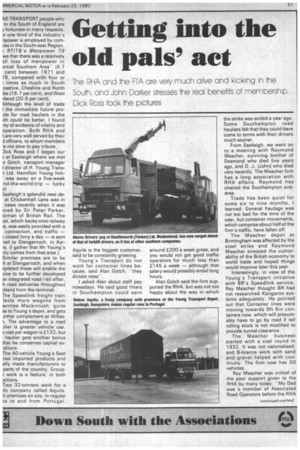
Page 54
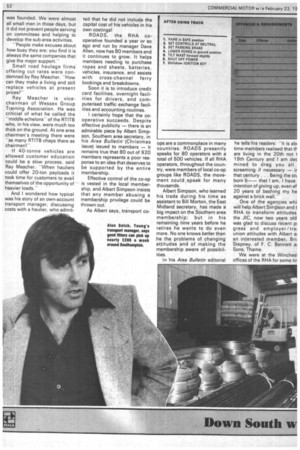
Page 55
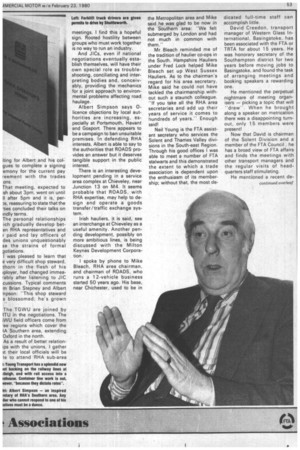
Page 56
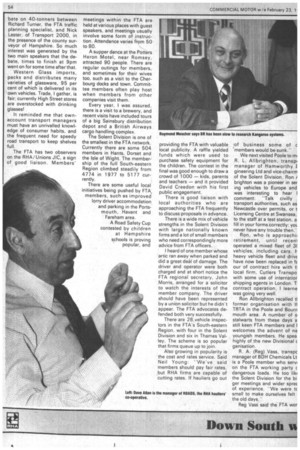
Page 57
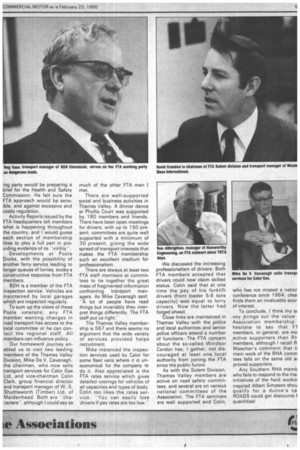
If you've noticed an error in this article please click here to report it so we can fix it.
The RHA and e HA are very much alive and kicking in Soutn, anc John Darker stresses the real benefits of mem oership, Dick Ross took e pictures
4D TRANSPORT people who in the South of England are
fortunate in many respects. )rone third of the industry's npower is employed by cornlies in the South-east Region.
RTITB's Manpower 79 ws that there was a relatively 3Il loss of manpower in )ntral Southern Area" (4.7
cent) between 1971 and 78, compared with four or times as much in South cashire, Cheshire and North les (16.7 per cent), and West aland (20.6 per cent).
klthough the level of trade I the immediate future procts for road hauliers in the Ith could be better, I found nty of evidence of vitality and operation. Both RHA and k are very well served by their
officers, to whom. members -e not slow to pay tribute. )ick Ross and I began our r at Eastleigh where we met n Gotch, transport manager I director of H. Young Transt Ltd. Hamilton Young him' was away on a five-week nd-the-world-trip — lucky n!
Eastleigh's splendid new cle at Chickenhall Lane was in news recently when it was ?tied by Sir Peter Parker, iirman of British Rail. The )1Dt, which backs onto railway was easily provided with a
connection, and traffic — ) closed lorry a day — is sent rail to Glengarnoch, in Ayre. gather that Mr Young's
comes from that area.) Similar premises are to be It at Glengarnoch, and when npleted these will enable the vice to be further developed 3n integrated road /rail affair, h road deliveries throughout )tland from the terminal.
The Speedlink freight train lects more wagons from vvntree Mackintosh, quite se to Young's depot, and gets Jrther complement at Wiliest The advantage to a road _flier is greater vehicle use. ? cost per wagon is £132, but haulier getsanother bonus that he conserves capital exiditure.
The 40-vehicle Young's fleet ries imported products and ally made manufacturers to parts of the country. Group? work is a feature, in both Dctions.
Two 32-tonners work for a ?ly company called Aquila, h premises on site, in regular Ds to and from Portugal. Aquila is the biggest customer, said to be constantly growing.
Young's Transport do not work for container lines because, said Alan Gotch, "they dictate rates''.
I asked Alan about staff pay nowadays. He said good fitters in Southampton could earn around £200 a week gross, and you would not get good traffic operators for much less than £145 a week — although that salary would possibly entail long hours.
Alan Gotch said the firm supported the RHA, but was not too happy about the way in which the strike was ended a year ago. Some Southampton road hauliers felt that they could have come to terms with their drivers much sooner.
From Eastleigh, we went on to a meeting with Raymond Meacher, surviving brother of Desmond who died five years ago, and D. J. (John) who died very recently. The Meacher firm has a long association with RHA affairs. Raymond has chaired the Southampton subarea.
Trade has been quiet for some six to nine months, I learned. General haulage was not too bad for the time of the year, but container movements, which corn prise about half of the firm's traffic, have fallen off.
The Meacher depot at Birmingham was affected by the steel strike and Raymond Meacher stressed the vulnerability of the British economy to world trade and hoped things would improve later this year.
Interestingly, in view of the Young's Transport initiative with BR's Speedlink service, Ray Meacher thought BR had not researched Kangaroo systems adequately. He pointed out that Container lines were moving towards 9ft 6in containers now, which will presumably have to go by road if rail rolling stock is not modified to provide tunnel clearance.
The Meacher business started with a coal round in 1932. It was not nationalised, and B-licence work with sand and gravel helped with continuity. The firm now has 50 vehicles.
Ray Meacher was critical of the poor support given to the RHA by many today. "My Dad was a member of Associated Road Operators before the RHA was founded. We were almost all small men in those days, but it did not prevent people serving on committees and helping to develop the sub-area activities.
"People make excuses about how busy they are; you find it is always the same companies that give the major support."
Small road haulage firms offering cut rates were condemned by Ray Meacher. -How can they make a living and still replace vehicles at present prices?'' Ray Meacher is vicechairman of Wessex Group Training Association. He was criticial of what he called the "middle echelonsof the RTITB who, in his view, were much too thick on the ground. At one area chairmen's meeting there were "as many RTITB chaps there as chairmenr
If 40-tonne vehicles are allowed customer education could be a slow process, said Ray Meacher. "When hauliers could offer 20-ton payloads it took time for customers to avail themselves of the opportunity of heavier loads."
And I wondered how typical was his story of an own-account transport manager, discussing costs with a haulier, who admit
ted that he did not include the capital cost of his vehicles in his own costings!
ROADS, the RHA cooperative founded a year or so ago and run by manager Dave Allen, now has 80 members and it continues to grow. It helps members needing to purchase ropes and sheets, batteries, vehicles, insurance, and assists with cross-channel ferry bookings and breakdowns.
Soon it is to introduce credit card facilities, overnight facilities for drivers, and computerised traffic exchange facilities and accounting routines.
I certainly hope that the cooperative succeeds. Despite effective publicity — there is an admirable piece by Albert Simpson, Southern area secretary, in his Area Bulletin. (Christmas issue) issued to members — it remains true that 80 out of 920 members represents a poor response to an idea that deserves to be supported by the entire membership.
Effective control of the co-op is vested in the local membership, and Albert Simpson insists that any member abusing a membership privilege could be thrown out.
As Albert says, transport co ops are a commonplace in many countries. ROADS presently speaks for 80 operators with a total of 500 vehicles. If all RHA operators, throughout the country, were members of local co-op groups like ROADS, the movement could speak for many thousands.
Albert Simpson, who learned his trade during his time as assistant to Bill Morton, the East Midland secretary, has made a big impact on the Southern area membership; but in his remaining nine years before he retires he wants to do even more. No one knows better than he the problems of changing attitudes and of making the membership aware of possibilities.
In his Area Bulletin editorial
he tells his readers: ''It is abo time members realised that tF are living in the 20th not I 19th Century and I am det mined to drag you all screaming if necessary — ir that century . . . Being the sti born b--that I am, I have intention of giving up, even at 20 years of bashing my he against a brick wall.''
One of the agencies whi will help Albert Simpson and t RHA to transform attitudes the JIC, now two years old was glad to discuss recent pi gress and employer /trai union attitudes with Albert al an interested member, Bri, Stepney, of F. C. Bennett al Sons, Thame.
We were at the Winches1 offices of the RHA for some tir iting for Albert and his colgues to complete a signing emony for the current pay reement with the trades ons.
That meeting, expected to sh about 3prn, went on until II after 5pm and it is, per)s, reassuring to state that the 'ties concluded their talks on !ndly terms.
The personal relationships ich gradually develop beten RHA representatives and 3 paid and lay officers of des unions unquestionably se the strains of formal gotiations.
I was pleased to learn that e very difficult shop steward, thorn in the flesh of his iployer, had changed immea'ably after listening to JIC cussions. Typical comments m Brian Stepney and Albert npson: -This shop steward s blossomed: he's grown The TGWU are joined by TU in the negotiations. The IVVU field officers come from -ee regions which cover the IA Southern area, extending Oxford in the north.
As a result of better relationips with the unions, I gather )t. their local officials will be le to attend RHA sub-area meetings. I find this a hopeful sign. Rooted hostility between groups who must work together is no way to run an industry.
And JICs, even if national negotiations eventually establish themselves, will have their own special role as troubleshooting, conciliating and interpreting bodies and, conceivably, providing the mechanics for a joint approach to environmental problems affecting road haulage.
Albert Simpson says 0licence objections by local authorities are increasing, especially at Portsmouth, Havant and Gosport. There appears to be a campaign to ban unsuitable premises. In defending RHA interests, Albert is able to say to the authorities that ROADS provides an answer but it deserves tangible support in the public interest, There is an interesting development pending in a service area complex at Chieveley, near Junction 13 on M4. It seems probable that ROADS, with RHA expertise, may help to design and operate a goods transfer/traffic exchange system.
Irish hauliers, it is said, see an interchange at Chieveley as a useful amenity. Another pending development, possibly on more ambitious lines, is being discussed with the Milton Keynes Development Corporation.
I spoke by phone to Mike Bleach, RHA area chairman, and chairman of ROADS, who runs a 12-vehicle business started 50 years ago. His base, near Chichester, used to be in the Metropolitan area and Mike said he was glad to be now in the Southern area: "We felt submerged by London and had not much in common with them."
Mr Bleach reminded me of the tradition of haulier co-ops in the South. Hampshire Hauliers under Fred Lock helped Mike Bleach set up West Sussex Hauliers. As to the chairman's regard for his area secretary, Mike said he could not have tackled the chairmanship without such a staunch colleague. "If you take all the RHA area secretaries and add up their years of service it comes to hundreds of years." Enough said!
Neil Young is the FTA assistant secretary who services the Solent and Thames Valley divisions in the South-east Region. Through his good offices I was able to meet a number of FTA stalwarts and this demonstrated the extent to which a trade association is dependent upon the enthusiasm of its membership; without that, the most de
dicated full-time staff can accomplish little.
David Creedon, transport manager of Western Glass International, Basingstoke, has been associated with the FTA or TRTA for about 15 years. He was honorary secretary of the Southampton district for two years before moving jobs to Basingstoke, and found the task of arranging meetings and booking speakers a rewarding one.
He mentioned the perpetual nightmare of meeting organisers — picking a topic that will "draw". When he brought along a speaker on metrication there was a disappointing turnout, only 15 members were present!
Now that David is chairman of the Solent Division and a member of the FTA Council , he has a broad view of FTA affairs and finds the meetings with other transport managers and the regular visits of headquarters staff stimulating.
He mentioned a recent decontinued overleaf
bate on 40-tonners between Richard Turner, the FTA traffic planning specialist, and Nick Lester, of Transport 2000, in the presence of the county surveyor of Hampshire. So much interest was generated by the two main speakers that the debate, times to finish at 9pm went on for some time after that.
Western Glass imports, packs and distributes many varieties of glassware, 95 per cent of which is delivered in its • own vehicles. Trade, I gather, is fair: currently High Street stores are overstocked with drinking glasses!
It reminded me that ownaccount transport managers must have an unrivalled knowledge of consumer habits, and the frequent need for speedy road transport to keep shelves full.
The FTA has two observers on the RHA/ Unions JIC, a sign of good liaison. Members' meetings within the FTA are held at various places with guest speakers, and meetings usually involve some form of jnstruction. Attendance varies from 50 to 80.
A supper dance at the Potters Heron Motel, near Ramsey, attracted 90 people. There are regular outings for members, and sometimes for their wives too, such as a visit to the Cherbourg docks and town. Committee members often play host when members from other companies visit them.
Every year, I was assured, there is a visit to a brewery, and recent visits have included tours of a big Sainsbury distribution depot and a British Airways cargo handling complex.
The Solent Division is one of the smallest in the FTA network. Currently there are some 504 members in Hants, Dorset and the Isle of Wight. The membership of the full South-eastern Region climbed steadily from 4774 in 1977 to 5177 currently.
There are some useful local initiatives being pushed by FTA. members, such as improved lorry driver accommodation and parking in the Portsmouth, Havant and Fareham area.
A Road Safety Cup contested by children at Hampshire schools is proving popular, and providing the FTA with valuable local publicity. A raffle yielded funds which were used to purchase safety equipment for the children. The contest in the final was good enough to draw a crowd of 1000 — kids, parents and teachers — and it provided David Creedon with his first public engagement.
There is good liaison with local authorities who are approaching the FTA frequently to discuss proposals in advance.
There is a wide mix of vehicle strengths in the Solent Division with large nationally known firms and a lot of small members who need correspondingly more advice from FTA officers.
I heard of one member whose artic ran away when parked and did a great deal of damage. The driver and operator were both charged and at short notice the FTA regional secretary, John Morris, arranged for a solicitor to watch the interests of the member company. The driver should have been represented by a union solicitor but he didn't appear. The FTA advocates defended both very successfully.
There are 28 vehicle inspectors in the FTA's South-eastern Region, with four in the Solent Division and six in Thames Valley. The scheme is so popular that firms queue up to join.
Also growing in popularity is the cost and rates service. Said Neil Young: "We've said members should pay fair rates, but RHA firms are capable of cutting rates. If hauliers go out of business some of members would be sunk."
We next visited Poole to mi R. L. Allbrighton, transp, manager of Hamworthy E gineering Ltd and vice-chairm of the Solent Division. Ron brighton was a pioneer in ser ing vehicles to Europe and was interesting to hear I comment: "Talk civilly transport authorities, such as Newcastle over permits, or t Licensing Centre at Swansea, to the staff at a test station, a fill in your forms correctly: yot. never have any trouble then.'
Ron, who is approachii retirement, until recent operated a mixed fleet of 3( vehicles, including cars. F heavy vehicle fleet and drivE have now been replaced in fE our of contract hire with ti local firm, Cutlers Transpo with some use of internatior shipping agents in London. T contract operation, I learne was going very well.
Ron Allbrighton recalled tl former organisation with ti .TRTA in the Poole and Bourn mouth area. A number of o stalwarts from these days a still keen FTA members and I welcomes the advent of ne youngish members. He spea highly of the new Divisional c ganisation.
R. A. (Reg) Vass, transpc manager of BDH Chemicals Lt is a Poole member who servi on the FTA working party c dangerous loads. He too liki the Solent Division for the bi ger meetings and wider spreE of experience. "We were tc small to make ourselves felt the old days."
Reg Vass said the FTA war ing party would be preparing a brief for the Health and Safety Commission. He felt sure the ETA approach would be sensible, and against excessive and costly regulation.
Activity Reports issued by the FTA headquarters tell members what is happening throughout the country, and I would guess each section of membership likes to play a full part in providing evidence of its "virility''.
Developments at Poole Docks, with the possibility of another ferry service leading to longer queues of lorries, evoke a constructive response from FTA members.
BDH is a member of the FTA inspection service. Vehicles are maintained by local garages which are inspected regularly.
To sum up the views of these Poole veterans: any ETA member wanting changes in road transport has access to the local committee or he can contact the regional staff. All members can influence policy.
Our homeward journey enabled us to visit two leading members of the Thames Valley Division, Mike De V. Cavanagh, the chairman, who now sells transport services for Calor Gas Ltd, and vice-chairman Colin Clark, group financial director and transport manager of W. S. Shuttleworth (Timber) Ltd, of Maidenhead. Both are -characters'', although I could say as
much of the other ETA men I met.
There are well-supported social and business activities in Thames Valley. A dinner dance at Phyllis Court was supported by 180 members and friends. There have been open meetings for drivers, with up to 150 present; committees are quite well supported with a. minimum of 30 present, giving the wide spread of transport interests that makes the FTA membership such an excellent medium for professionalism.
There are always at least two 'FTA staff members at committees to tie together the great mass of fragmented information confronting transport managers. As Mike Cavanagh said: -A lot of people have read things but invariably they interpret things differently. The ETA staff put us right.'' The Thames Valley membership is 567 and there seems no argument that the wide variety of services provided helps (ecru itrn ent.
Mike instanced the inspection services used by Calor for some fleet vans where it is uneconomical for the company to do it. Also appreciated is the FTA rates service which gives detailed costings for vehicles of all capacities and types of body. Colin too likes the rates service "You can easily lose drivers if pay rates are too low.''
Ron Alihrighton, manager of Hamworthy Engineering, an FTA stalwart since TRTA days.
We discussed the increasing professionalism of drivers. Both FTA members accepted that drivers could now claim skilled status. Colin said that at one time the pay of his forklift drivers (front loader 5-6 tons capacity) was equal to lorry drivers. Now the latter had forged ahead.
Close links are maintained in Thames Valley with the police and local authorities and senior police officers attend a number of functions. The FTA concern about the so-called Windsor Cordon has, I gather, not discouraged at least one local authority from joining the FTA since the public furore.
As with the Solent Division, Thames Valley members are active on road safety committees, and several are on various national committees of the Association. The ETA seminars are well supported and Colin, who has not missed a natior conference since 1964, deal finds them an invaluable sour of interest.
To conclude, I think my si vey Lbrings out the value Association membership. hesitate to say that El members, in general, are mo lactive supporters than RE members, although I recall R Meacher's comment that tl main work of the RHA comm tees falls on the same old ai proved supporters.
Any Southern RHA memb who -fails to respond to the mai initiatives of the hard workin inspired Albert Simpson shou qualify for a dunce's ca ROADS Could get discounts f quantities!




































































































































